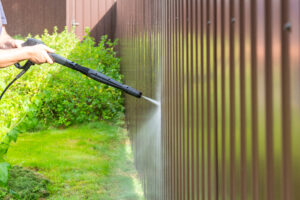Your driveway isn’t just a walkway to your garage but a part of your home’s overall first impression. Down here in Jersey, our driveways face a different set of adversaries from salty beach air to winter road salt. Cleaning isn’t just good for appearances, it’s all about maintaining your investment.
One way to ensure this is to do pressure washing. When it comes to this, one question you may have is how often to do it. The quick answer is that there is no secret number. It really just boils down to a few big factors unique to your home and the overall climate. This article looks at exactly that.
The Golden Rule
For the majority of New Jersey homeowners, an annual professional pressure washing every one to two years is a good rule of thumb.

Power Washing Your Driveway Is Important
This annual maintenance helps strike a perfect balance. It does this by preventing dirt from becoming a permanent guest without over-cleaning and harming the surface. Some homes need visits every year, and some can get away with waiting a bit longer. The exact schedule for you will hence depend on a few variables.
Factors to Consider
Proximity to the Coast
If you are situated near the Jersey Shore, your driveway battles with more than dirt. Seaside air is full of salt and sand, which are erosive and corrosive. The salty spray settles on your pavement, accelerating wear and retaining moisture. On shore properties, we typically recommend cleaning annually, preferably in the spring. This helps to erase the corrosive remnants of winter storms and prepare the pavement for the moist summer.
Tree Coverage
Do you have nice, mature trees on your property? Their falling leaves, seeds, and sap are a main cause of stains. Leaves on pavement will turn foul, causing black, tannin-based stains and a build-up of mold and mildew. If you have a tree-covered driveway, an annual clean is a good idea to avoid these rigid stains from becoming permanent.
Seasonal and Weather Wear
Cold winters make asphalt and concrete scraped and marked by snowplows, rock salt, and de-ice materials. These materials cause erosion and leave white, chalky stains because they are surface-abrasive. Black mildew and mold are prevalent during summer and high humidity times. Therefore, spring or post-winter washing gives your driveway a fresh start after the worst of it.
Visible Dirt and Stains
Your driveway will inform you when it is cleaning time. This usually happens when you notice black spots. These could be as a result of grease or oil from vehicles. The earlier you clean them, the higher the probability you can get rid of them. Black or green streaks are a sign that there is mold, mildew, or algae growth, which we see much too frequently in our rainy climate.
Overall, dirt and grime accumulation can give your driveway the look of being worn and old. Slipping on the walkway indicates that algae or mold have taken over, which can be quite dangerous to the people walking over the driveway.
Why Timing and Technique are Crucial
It is half the battle to know when to clean. The other half is all about knowing how to do it perfectly. This is exactly where professional cleaning comes in.
A DIY approach could cause damage to surfaces. This is because too much pressure can etch concrete and strip away asphalt layers. It could also drive water into tiny cracks that later expand when the water freezes in winter.
To prevent such issues, consider partnering with professionals. At Coastal Restorations, we use the soft washing technique. This method makes use of low-pressure specialty tips and natural cleaning chemicals that attract dirt, kill organic matter, and extract it safely. The best time to get this task done is during late spring or early fall. It is a time when the cleaning chemicals evaporate steadily because the temperature is moderate. This means that the surface will have adequate time to completely dry out.
A clean driveway is more appealing, safer for your family members to walk on, and more protected from the abrasion that eventually necessitates expensive repair. While a do-it-yourself rental can be tempting, the risk of poor technique and the hassle of doing it yourself typically justify the cost.
At Coastal Restorations, we understand how to analyze your specific circumstances and recommend the perfect cleaning plan. Let us see to it that your property is safeguarded and your curb appeal maintained, regardless of what New Jersey has in store for you.




